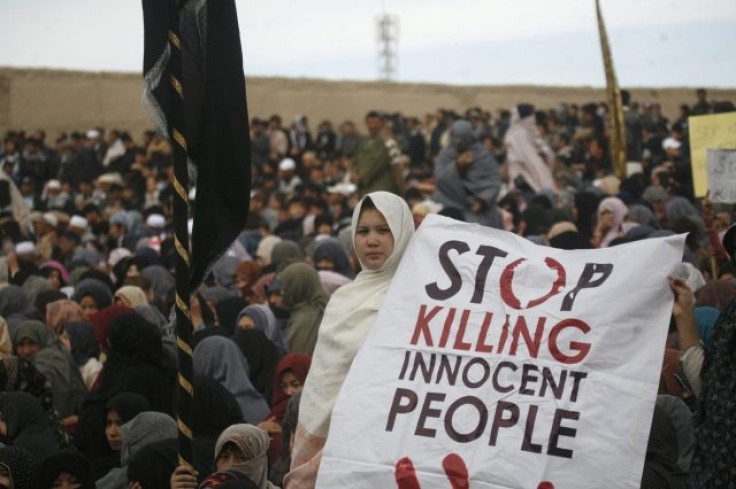Pakistan Hazaras Refuse To Bury Dead After Deadly Quetta Bombing; Blame Govt For Negligence

Pakistan’s ethnic minority Hazaras continued to stage a sit-in Tuesday, refusing to bury the bodies of scores of people killed in a bomb blast in Quetta Saturday.
The Hazaras, who practice Shia denomination of Islam, in Sunni-majority Pakistan and Afghanistan, blame the Pakistani government for its negligence in acting against Sunni extremism to contain the violence.
Saturday’s attack that killed at least 89 people and injured some 169 was carried out by a Sunni militant group targeting Hazaras on the outskirts of the southwestern city of Quetta.
About 4,000 women began the protest in Quetta Sunday evening, blocking a road and refusing to carry out the traditional ritual of burying the dead until action was taken against the perpetrators, AFP reported.
A local Shiite leader, Qayyum Changezi, told AFP that protesters “will not bury the dead until a targeted operation is launched.”
On Saturday, the Sunni extremist group Lashkar-e-Jhangvi (LeJ) claimed responsibility for the attack, according to Reuters.
Last month, the LeJ claimed responsibility for two deadly suicide bombings in another Quetta neighborhood, Alamdar Road, that killed 85 Shiite Muslims. Authorities had described the twin bombings as one of the worst attacks on the Shiite minority.
Another bomb blast at a Shiite mosque earlier in February killed 24 people, raising the Shia death toll to more than 200 in less than two months of 2013.
The governor of Balochistan province, Nawab Zulfikar Ali Magsi, Sunday accused intelligence and law enforcement agencies of being unable to maintain law and order, saying their agents were “either too scared to go after the terror-mongers or too clueless to even know who they are dealing with.”
“It’s their job to preempt such attacks. That’s what they are paid for. They failed all these innocent people who died in this catastrophic bomb blast,” the governor told Pakistan’s Geo News.
Following the Jan. 10 attack, Shiite leaders called on Pakistan's military to take over security in Quetta and quell Sunni extremism.
Magsi was made provincial chief executive after the government of Chief Minister Nawab Aslam Raisani was sacked Jan. 14 in the wake of a four-day protest by the Hazaras.
Meanwhile, Pakistan’s News International reported that Saturday’s carnage could have been prevented had the security forces made concerted efforts to arrest a coterie of terrorists belonging to Usman Saifullah Kurd faction of the LeJ, as recommended in a secret dossier containing details about perpetrators of last month's attack on Alamdar Road.
The dossier was prepared by the Quetta police following the imposition of the governor’s rule in Balochistan, according to the News International report published Tuesday.
Chief Justice Iftikhar Muhammad Chaudhry remarked that an operation cleanup should have been conducted against the LeJ, during a hearing Tuesday on the latest carnage, Express Tribune News reported.
The chief justice said that it is not understandable how the incident took place in the presence of the Frontier Corps, Pakistan’s federal military force under the paramilitary command.
The chief justice maintained that the intelligence agencies failed in providing security information and questioned why LeJ members were not arrested yet.
According to Human Rights Watch, more than 400 Shiites were killed in Pakistan last year. The rights group said more than 125 were killed in Balochistan province, most of them Hazaras. Some hard-line Shiite groups have struck back by killing Sunni clerics.
© Copyright IBTimes 2024. All rights reserved.












